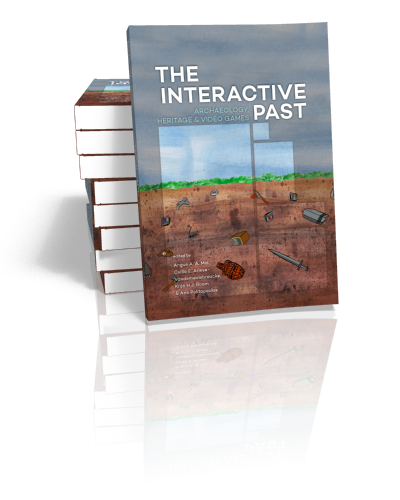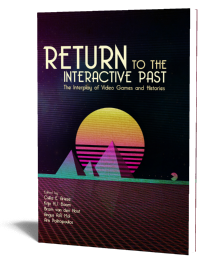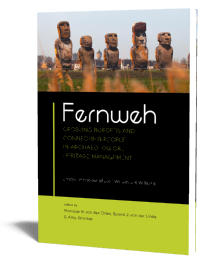The Interactive Past
Archaeology, Heritage, and Video Games
Edited by Angus A.A. Mol, Csilla E. Ariese, Krijn H.J. Boom & Aris Politopoulos | 2017

The Interactive Past
Archaeology, Heritage, and Video Games
Edited by Angus A.A. Mol, Csilla E. Ariese, Krijn H.J. Boom & Aris Politopoulos | 2017
Paperback ISBN: 9789088904363 | Hardback ISBN: 9789088904370 | Imprint: Sidestone Press | Format: 182x257mm | 236 pp. | Language: English | >30 illus. (fc) | Keywords: video games, archaeology, heritage, history | download cover
Read online or downloaded 5884 times
-
Digital & Online access
This is a full Open Access publication, click below to buy in print, browse, or download for free.
-
Buy via Sidestone (EU & UK)
-
Buy via our Distributors (WORLD)
For non-EU or UK destinations you can buy our books via our international distributors. Although prices may vary this will ensure speedy delivery and reduction in shipping costs or import tax. But you can also order with us directly via the module above.
UK international distributor
USA international distributor
-
Bookinfo
Paperback ISBN: 9789088904363 | Hardback ISBN: 9789088904370 | Imprint: Sidestone Press | Format: 182x257mm | 236 pp. | Language: English | >30 illus. (fc) | Keywords: video games, archaeology, heritage, history | download cover
Read online or downloaded 5884 times

We will plant a tree for each order containing a paperback or hardback book via OneTreePlanted.org.
Video games, even though they are one of the present’s quintessential media and cultural forms, also have a surprising and many-sided relation with the past. From seminal series like Sid Meier’s Civilization or Assassin’s Creed to innovative indies like Never Alone and Herald, games have integrated heritages and histories as key components of their design, narrative, and play. This has allowed hundreds of millions of people to experience humanity’s diverse heritage through the thrill of interactive and playful discovery, exploration, and (re-)creation. Just as video games have embraced the past, games themselves are also emerging as an exciting new field of inquiry in disciplines that study the past. Games and other interactive media are not only becoming more and more important as tools for knowledge dissemination and heritage communication, but they also provide a creative space for theoretical and methodological innovations.
The Interactive Past brings together a diverse group of thinkers — including archaeologists, heritage scholars, game creators, conservators and more — who explore the interface of video games and the past in a series of unique and engaging writings. They address such topics as how thinking about and creating games can inform on archaeological method and theory, how to leverage games for the communication of powerful and positive narratives, how games can be studied archaeologically and the challenges they present in terms of conservation, and why the deaths of virtual Romans and the treatment of video game chickens matters. The book also includes a crowd-sourced chapter in the form of a question-chain-game, written by the Kickstarter backers whose donations made this book possible. Together, these exciting and enlightening examples provide a convincing case for how interactive play can power the experience of the past and vice versa.
Tutorial: An introduction to archaeology, heritage, and video games
Angus A.A. Mol, Csilla E. Ariese-Vandemeulebroucke, Krijn H.J. Boom & Aris Politopoulos
Part I: Ethical Approaches to Heritage and Video Games
1. Storytelling for the Next Generation: How a nonprofit in Alaska harnessed the power of video games to share and celebrate cultures
Cook Inlet Tribal Council
2. Tradigital Knowledge: Indigenous video games, copyright, and the protection of traditional knowledge
Gabrielle Hughes
3. Chickens in Video Games: Archaeology and ethics inform upon complex relationships
B. Tyr Fothergill & Catherine Flick
4. Herald: How Wispfire used history to create fiction
Roy van der Schilden & Bart Heijltjes
Part II: Analyzing and Designing Games from an Archaeological Perspective
5. Designing and Developing a Playful Past in Video-Games
Tara Jane Copplestone
6. Video Games as Archaeological Sites: Treating digital entertainment as built environments
Andrew Reinhard
7. Single White Looter: Have whip, will travel
Erik Malcolm Champion
8. On Games that Play Themselves: Agent based models, archaeogaming, and the useful deaths of digital Romans
Shawn Graham
Part III: Playful Heritage Outreach
9. Playing the Archive: Let’s Play videos, game preservation, and the exhibition of play
René Glas, Jesse de Vos, Jasper van Vught & Hugo Zijlstra
10. Explaining Archaeological Research with Video Games: The case of Evolving Planet
Xavier Rubio-Campillo, Jorge Caro Saiz, Guillem H. Pongiluppi, Guillem Laborda Cabo & David Ramos Garcia
11. Crafting the Past: Unlocking new audiences
Julianne McGraw, Stephen Reid & Jeff Sanders
12. The Potential for Modding Communities in Cultural Heritage
Jakub Majewski
13. Looking for Group: A collective chapter writing game
The Interactive Past Community
Leveling Up: The future of interactive pasts
Angus A.A. Mol, Csilla E. Ariese-Vandemeulebroucke, Krijn H.J. Boom & Aris Politopoulos
Afterword
Colleen Morgan

Dr. Csilla E. Ariese
Csilla E. Ariese is a museologist with an interest in decolonial practices, community engagement, maritime archaeology, and video games. Her PhD dissertation (2018, Leiden University) explored Caribbean museums and the practices and processes through which they engage with a diversity of communities. Her recent postdoctoral research at the University of Amsterdam focused on the Amsterdam Museum and how it deals with the colonial pasts of its collections and the city. She is a co-founder of the VALUE Foundation, among others organizing the RoMeincraft project and curating the Culture Arcade exhibition. Her publications span the topics of decolonizing museums, Caribbean museums, interactive pasts, and VOC shipwrecks in Australia.

Dr. Krijn H.J. Boom
Krijn Boom started his career with a PhD on the sociocultural impact of public activities in archaeology. Subsequently, he was a post-doctoral researcher in heritage management at the Faculty of Archaeology of Leiden University and Project Manager Blended Learning at the University of Amsterdam. Krijn also co-founded the VALUE project – for research and outreach on the past, heritage, and video games. Currently, Krijn is an education consultant and publisher for Acco, a Flemish academic publishing company. Here, he combines his love for digital innovations in the didactic process with established media, in an ongoing quest to find the optimal ways to transfer knowledge and engage audiences.

Dr. Angus A.A. Mol
Angus Mol is an assistant professor at the Leiden University Centre for Digital Humanities. Here he teaches and does research, not only on how digital tools can be used in the study of cultures and societies, but also how digital media shape our engagement with the present and past. With a background in archaeology and as a co-founder of VALUE, his research and outreach specifically address the intersections of the past and video games. His previous publications have appeared at Sidestone Press and a number of international journals and handbooks. These include the first Interactive Past volume as well as work in theoretical and Caribbean archaeology and network studies. He also writes blogs and produces other media as Dr. Random on VALUE’s Interactive Pasts website.

Aris Politopoulos MA
Aris Politopoulos is a lecturer for the Archaeology of the Ancient Near East at the Faculty of Archaeology, Leiden University, and a postdoctoral researcher at the Leiden University Center for Arts in Society working on the Past-at-Play Lab project. His research focuses on ancient Near Eastern empires, the archaeology of the Eastern Mediterranean, the archaeology of Play, and the archaeological study of video games. He is also a co-founding member of the VALUE Foundation and has published extensively on the topic of video games and archaeology.
Abstract:
Video games, even though they are one of the present’s quintessential media and cultural forms, also have a surprising and many-sided relation with the past. From seminal series like Sid Meier’s Civilization or Assassin’s Creed to innovative indies like Never Alone and Herald, games have integrated heritages and histories as key components of their design, narrative, and play. This has allowed hundreds of millions of people to experience humanity’s diverse heritage through the thrill of interactive and playful discovery, exploration, and (re-)creation. Just as video games have embraced the past, games themselves are also emerging as an exciting new field of inquiry in disciplines that study the past. Games and other interactive media are not only becoming more and more important as tools for knowledge dissemination and heritage communication, but they also provide a creative space for theoretical and methodological innovations.
The Interactive Past brings together a diverse group of thinkers — including archaeologists, heritage scholars, game creators, conservators and more — who explore the interface of video games and the past in a series of unique and engaging writings. They address such topics as how thinking about and creating games can inform on archaeological method and theory, how to leverage games for the communication of powerful and positive narratives, how games can be studied archaeologically and the challenges they present in terms of conservation, and why the deaths of virtual Romans and the treatment of video game chickens matters. The book also includes a crowd-sourced chapter in the form of a question-chain-game, written by the Kickstarter backers whose donations made this book possible. Together, these exciting and enlightening examples provide a convincing case for how interactive play can power the experience of the past and vice versa.
Contents
Tutorial: An introduction to archaeology, heritage, and video games
Angus A.A. Mol, Csilla E. Ariese-Vandemeulebroucke, Krijn H.J. Boom & Aris Politopoulos
Part I: Ethical Approaches to Heritage and Video Games
1. Storytelling for the Next Generation: How a nonprofit in Alaska harnessed the power of video games to share and celebrate cultures
Cook Inlet Tribal Council
2. Tradigital Knowledge: Indigenous video games, copyright, and the protection of traditional knowledge
Gabrielle Hughes
3. Chickens in Video Games: Archaeology and ethics inform upon complex relationships
B. Tyr Fothergill & Catherine Flick
4. Herald: How Wispfire used history to create fiction
Roy van der Schilden & Bart Heijltjes
Part II: Analyzing and Designing Games from an Archaeological Perspective
5. Designing and Developing a Playful Past in Video-Games
Tara Jane Copplestone
6. Video Games as Archaeological Sites: Treating digital entertainment as built environments
Andrew Reinhard
7. Single White Looter: Have whip, will travel
Erik Malcolm Champion
8. On Games that Play Themselves: Agent based models, archaeogaming, and the useful deaths of digital Romans
Shawn Graham
Part III: Playful Heritage Outreach
9. Playing the Archive: Let’s Play videos, game preservation, and the exhibition of play
René Glas, Jesse de Vos, Jasper van Vught & Hugo Zijlstra
10. Explaining Archaeological Research with Video Games: The case of Evolving Planet
Xavier Rubio-Campillo, Jorge Caro Saiz, Guillem H. Pongiluppi, Guillem Laborda Cabo & David Ramos Garcia
11. Crafting the Past: Unlocking new audiences
Julianne McGraw, Stephen Reid & Jeff Sanders
12. The Potential for Modding Communities in Cultural Heritage
Jakub Majewski
13. Looking for Group: A collective chapter writing game
The Interactive Past Community
Leveling Up: The future of interactive pasts
Angus A.A. Mol, Csilla E. Ariese-Vandemeulebroucke, Krijn H.J. Boom & Aris Politopoulos
Afterword
Colleen Morgan

Dr. Csilla E. Ariese
Csilla E. Ariese is a museologist with an interest in decolonial practices, community engagement, maritime archaeology, and video games. Her PhD dissertation (2018, Leiden University) explored Caribbean museums and the practices and processes through which they engage with a diversity of communities. Her recent postdoctoral research at the University of Amsterdam focused on the Amsterdam Museum and how it deals with the colonial pasts of its collections and the city. She is a co-founder of the VALUE Foundation, among others organizing the RoMeincraft project and curating the Culture Arcade exhibition. Her publications span the topics of decolonizing museums, Caribbean museums, interactive pasts, and VOC shipwrecks in Australia.

Dr. Krijn H.J. Boom
Krijn Boom started his career with a PhD on the sociocultural impact of public activities in archaeology. Subsequently, he was a post-doctoral researcher in heritage management at the Faculty of Archaeology of Leiden University and Project Manager Blended Learning at the University of Amsterdam. Krijn also co-founded the VALUE project – for research and outreach on the past, heritage, and video games. Currently, Krijn is an education consultant and publisher for Acco, a Flemish academic publishing company. Here, he combines his love for digital innovations in the didactic process with established media, in an ongoing quest to find the optimal ways to transfer knowledge and engage audiences.

Dr. Angus A.A. Mol
Angus Mol is an assistant professor at the Leiden University Centre for Digital Humanities. Here he teaches and does research, not only on how digital tools can be used in the study of cultures and societies, but also how digital media shape our engagement with the present and past. With a background in archaeology and as a co-founder of VALUE, his research and outreach specifically address the intersections of the past and video games. His previous publications have appeared at Sidestone Press and a number of international journals and handbooks. These include the first Interactive Past volume as well as work in theoretical and Caribbean archaeology and network studies. He also writes blogs and produces other media as Dr. Random on VALUE’s Interactive Pasts website.

Aris Politopoulos MA
Aris Politopoulos is a lecturer for the Archaeology of the Ancient Near East at the Faculty of Archaeology, Leiden University, and a postdoctoral researcher at the Leiden University Center for Arts in Society working on the Past-at-Play Lab project. His research focuses on ancient Near Eastern empires, the archaeology of the Eastern Mediterranean, the archaeology of Play, and the archaeological study of video games. He is also a co-founding member of the VALUE Foundation and has published extensively on the topic of video games and archaeology.
-
Digital & Online access
This is a full Open Access publication, click below to buy in print, browse, or download for free.
-
Buy via Sidestone (EU & UK)
-
Buy via our Distributors (WORLD)
For non-EU or UK destinations you can buy our books via our international distributors. Although prices may vary this will ensure speedy delivery and reduction in shipping costs or import tax. But you can also order with us directly via the module above.
UK international distributor
USA international distributor
- Browse all books by subject
-
Search all books

We will plant a tree for each order containing a paperback or hardback book via OneTreePlanted.org.
You might also like:
© 2025 Sidestone Press KvK nr. 28114891 Privacy policy Sidestone Newsletter Terms and Conditions (Dutch)








